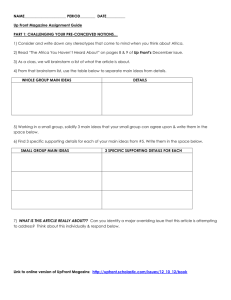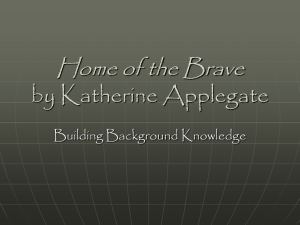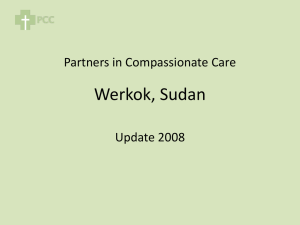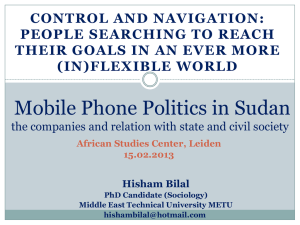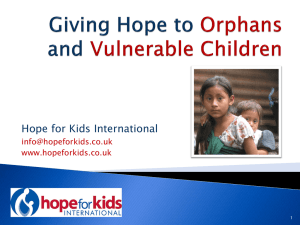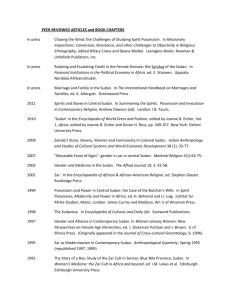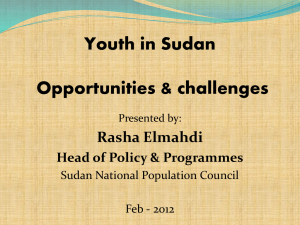DOC - End Impunity Organization
advertisement
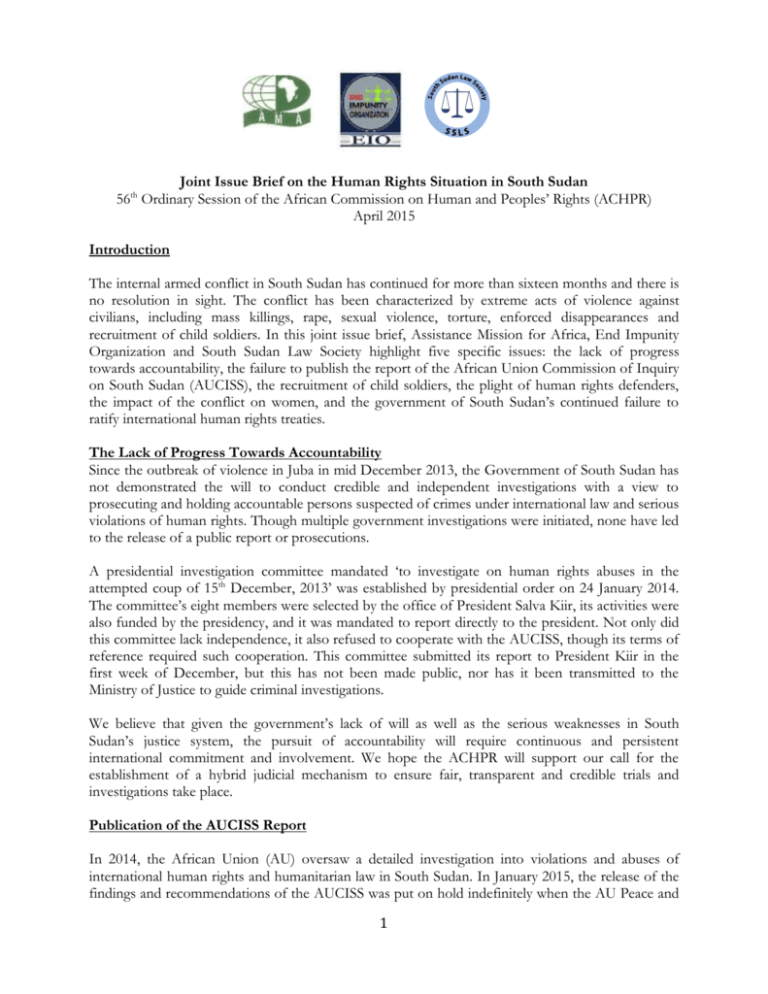
Joint Issue Brief on the Human Rights Situation in South Sudan 56th Ordinary Session of the African Commission on Human and Peoples’ Rights (ACHPR) April 2015 Introduction The internal armed conflict in South Sudan has continued for more than sixteen months and there is no resolution in sight. The conflict has been characterized by extreme acts of violence against civilians, including mass killings, rape, sexual violence, torture, enforced disappearances and recruitment of child soldiers. In this joint issue brief, Assistance Mission for Africa, End Impunity Organization and South Sudan Law Society highlight five specific issues: the lack of progress towards accountability, the failure to publish the report of the African Union Commission of Inquiry on South Sudan (AUCISS), the recruitment of child soldiers, the plight of human rights defenders, the impact of the conflict on women, and the government of South Sudan’s continued failure to ratify international human rights treaties. The Lack of Progress Towards Accountability Since the outbreak of violence in Juba in mid December 2013, the Government of South Sudan has not demonstrated the will to conduct credible and independent investigations with a view to prosecuting and holding accountable persons suspected of crimes under international law and serious violations of human rights. Though multiple government investigations were initiated, none have led to the release of a public report or prosecutions. A presidential investigation committee mandated ‘to investigate on human rights abuses in the attempted coup of 15th December, 2013’ was established by presidential order on 24 January 2014. The committee’s eight members were selected by the office of President Salva Kiir, its activities were also funded by the presidency, and it was mandated to report directly to the president. Not only did this committee lack independence, it also refused to cooperate with the AUCISS, though its terms of reference required such cooperation. This committee submitted its report to President Kiir in the first week of December, but this has not been made public, nor has it been transmitted to the Ministry of Justice to guide criminal investigations. We believe that given the government’s lack of will as well as the serious weaknesses in South Sudan’s justice system, the pursuit of accountability will require continuous and persistent international commitment and involvement. We hope the ACHPR will support our call for the establishment of a hybrid judicial mechanism to ensure fair, transparent and credible trials and investigations take place. Publication of the AUCISS Report In 2014, the African Union (AU) oversaw a detailed investigation into violations and abuses of international human rights and humanitarian law in South Sudan. In January 2015, the release of the findings and recommendations of the AUCISS was put on hold indefinitely when the AU Peace and 1 Security Council (AUPSC) decided to defer consideration of the AUCISS’s final report “until a later date” for fear of undermining the ongoing peace talks underway between the warring parties in South Sudan. Shortly thereafter, a document purporting to be a draft of the report was leaked to the media. The leaked document included the names of numerous informants, as well as individuals that it alleges are responsible for atrocities. As the first inquiry of its kind for the AU, the AUCISS was an opportunity for the AU to demonstrate the viability of ‘African solutions to African problems’ and its commitment to condemning and rejecting impunity, as provided for in the AU’s constitutive act. The AUCISS also instilled hope in many South Sudanese that after a series of non-transparent and ineffective investigations at the national level, a broader effort to address the legacy of violence in the country might find support among key regional and international partners. TheAUPSC’s failure to publish the AUCISS report, coupled with the subsequent leak,has dealt a blow to efforts to promote justice and reconciliation in South Sudan. Theinformation from the inquiry that is now in the public domain mostly consists of uncorroborated statements and observations made by people who provided testimony to the AUCISS, withno way to test the veracity of the information. The manner in which leaked document names informants also represents an egregious breach of confidentiality and witness protection that has put the safety and wellbeing of numerous South Sudanese activists, academics and government officials at risk. We believe that the publication of the AUCISS report could serve as a powerful deterrent to people responsible for atrocities in South Sudan by showing them that they will no longer be permitted to commit these acts behind closed doors. Even in the absence of a broader peace agreement, the publication of the report could help deter further acts of violence against civilians and contribute to a more informed discussion of how to promote truth, justice, reconciliation and healing moving forward. We therefore urge the ACHPR to call on the AUPSC to immediately consider, publish and disseminate the final AUCISS report. Recruitment of Child Soldiers Both government and opposition forces, and their allies, have recruited and used numerous child soldiers. The United Nations Fund for Children (UNICEF) has estimated that as many as 12,000 children have fought in the current conflict. The Sudan People’s Liberation Army (SPLA) has been listed by the United Nations Secretary General for the recruitment and use of child soldiers since 2005. Progress was made before the conflict in demobilizing child soldiers and in ending the abusive practice of recruiting children, with South Sudan’s government, in cooperation with UN agencies, demobilizing just under 1,000 children between 2009 and 2013. This progress has been lost with the return to war. The SPLM-inOpposition and the ‘White Army’—a collection of community fighters from certain groups from the Nuer ethnicity—have now also been listed for recruiting and using child soldiers. In part because the government and army has not provided any accountability for commanders who have used and recruited child soldiers, the practice has continued, growing unimpeded in the current conflict. Children have been abducted in large numbers in this conflict and thrown into battle. For example, hundreds of children were taken from schools in Unity state in December 2013 by renegade opposition commanders, trucked away and then forced to fight the following day. More recently, 2 between January and March a government-allied force in Upper Nile state recruited hundreds of children, many of them forcibly. Large-scale recruitment of child soldiers by government forces has also taken place in Unity state and the government has used children to defend the towns of Bentiu and Rubkona in that state. The UN and independent human rights researchers have found the practice of using children, both on the frontline and as bodyguards and servants for commanders, to be widespread in this conflict. Military and government officials have made promises to end the use of child soldiers in this conflict. However very little progress has been made by the government to implement a June 2014 recommitment to an earlier joint UN-government action plan, or by the opposition to realize a May 2014 action plan to end grave violations against children. The African Committee of Experts on the Rights and Welfare of the Child (ACERWC), in a press statement in August 2014, condemned the use and recruitment of child soldiers in what they described as ‘a war on the children of South Sudan’. The body described ‘the escalating recruitment of children into forces associated with the armed conflict. Children associated with armed forces is one of the main protection issues that have to be addressed on a basis of absolute urgency’. The ACERWC called on both the government and opposition to honor their mid-2014 commitments to the UN end these abusive practices. South Sudan’s 2008 Child Act also criminalizes the recruitment of children (defined as anyone under the age of 18 years of age) but researchers have been unable to identify any cases where this provision has been the basis of a criminal prosecution. The Plight of Human Rights Defenders and Journalists in South Sudan Human rights defenders and journalists have been at risk ever since South Sudan gained independence. Since the outbreak of conflict, rights to freedom of expression and association guaranteed by the Transitional Constitution of South Sudan have been increasingly eroded through intimidation and illegal detentions of human rights defenders and journalists. South Sudan’s National Security Service (NSS) in particular has been involved in the intimidation, arrest, harassment and censorship of the media and human rights defenders. An NSS Bill that recently passed the National Legislative Assembly has further emboldened the NSS.The Bill offers legal cover for arbitrary detentions and operations that breach rights safeguarded in the Transitional Constitution of South Sudan as well as international human rights law. The Bill grants the NSS sweeping powers of arrest, detention, search and seizure. If the Bill is enacted in its current form, it will likely reduce the little operational space that human rights defenders have left. Numerous human rights defenders have already been threatened and intimidated this year. In one recent example, a presenter for South Sudan Television (SSTV) was arrested after interviewing the caretaker governor of Northern Bahr-el-Ghazal State. Other human rights defenders have fled the country for their safety after serious intimidation. The conflict has brought a host of new challenges for human rights defenders. On 17 February 2015, the Minister of Information and Broadcasting threatened to shut down the United Nations Mission in South Sudan (UNMISS) operated radio, Miraya FM, for interviewing the rebels. In 2014, Bakhita Radio was shut down by the NSS and several journalists arrested. This was attributed to the radio airing news about fighting in Unity and Jonglei states of South Sudan. The Nation Mirror newspaper was also shut down by the NSS in February 2015 for printing ‘anti-government’ articles. 3 Impact of the Conflict on South Sudanese Women When the women of South Sudan voted for independence in the 2011 referendum on selfdetermination, they did so expecting improved wellbeing and more equal opportunities. Indeed, even before the conflict erupted, women South Sudanese women faced numerous forces of discrimination and marginalization, including low levels of literacy, pronounced gender gaps in education, frequent early and forced marriage, and one of the highest maternal mortality rates in the world—estimated at 2,054 deaths per 100,000 live births. Any hopes or progress were dashed by the conflict that erupted in December 2013. Women have born a disproportionate share of the burden of the conflict. They have been subjected to rape, gangrape and other forms of sexual violence. Often, because abuses happen in areas that are not accessible due to insecurity, many survivors are not able to access medical care. Even in urban areas, procedural obstacles systematically prevent women from accessing care. The United Nations Mission in South Sudan (UNMISS) has noted that sexual violence has been a “consistent characteristic” of the conflict in all affected states. In many cases, women have been forced to care for their entire households on their own because their husbands were killed, are missing or have gone to join armed groups. Poor economic conditions, displacement, food insecurity, and rising crime rates make life all the more difficult for women running single-headed households. In October 2014, the Special Representative of the Secretary-General on Sexual Violence in Conflict and the President of South Sudan signed a Joint Communiqué, which outlined steps the Government will take to prevent and address sexual violence. The agreement lists priority areas for action, including ensuring medical, psychosocial and legal assistance to victims, addressing impunity, security and justice sector reform, and ensuring that sexual violence crimes are explicitly addressed in the peace process. Ratification of African Regional Human Rights Instruments Despite almost four years of independence, South Sudan has not yet completed ratification of any core human rights treaties that prescribe the minimum standards by which states must treat their citizens. The National Legislative Assembly voted to ratify the African Charter in October 2013 and the African Charter on the Rights and Welfare of the Child in October 2014. Yet, South Sudan has not deposited instruments of ratification with the AU and is therefore not a state party to these treaties. South Sudan is the only member state of the African Union that is not party to the African Charter. South Sudan has similarly failed to deposit instruments of ratification for the Convention against Torture and Other Cruel, Inhuman or Degrading Treatment or Punishment (CAT) and its Optional Protocol, the Convention on the Elimination of All forms of Discrimination against Women (CEDAW) and its Optional Protocol, and the Convention on the Rights of the Child (CRC) and its Optional Protocols on the involvement of children in armed conflict and on the sale of children, child prostitution and child pornography. Ratification for these human rights instruments has been approved by the National Legislative Assembly. 4 In March 2013, the African Commission on Human and Peoples’ Rights issued a resolution on South Sudan in which it called on the Government to immediately ratify and domesticate the African Charter and other human rights instruments. The Commission reiterated this call to South Sudan’s delegation during the 55th Session of the African Commission.We call on the Commission to again call on South Sudan to complete the ratification process. We also remind the Commission that as South Sudan is not a state party to the African Charter, government representatives who attend the Session should be denied the opportunity to make a statement or respond. Conclusion and Recommendations While no one knows the number of people who have been killed during the conflict, some estimate that fifty thousand or more may have lost their lives. Two million people have been displaced and 2.5 million face crisis levels of food insecurity. The African continent cannot stand by as yet another generation of South Sudanese is lost to conflict. In order to address the issues of concern outlined above, we urge the ACHPR to: On Accountability: Call on the Government to publish the report of the presidential investigation committee; Recommend the fair, credible investigation and prosecution of crimes including the use and recruitment of child soldiers, in accordance with international standards, through the establishment of a hybrid tribunal and/or before the ICC; Call on South Sudan torequest international assistance to establish a hybrid mechanism to try the most serious crimes committed during the current conflict; Call on the international community to commit to providing support to an internationally assisted justice mechanism. On the AUCISS Report: Call on the AUPSC to immediately consider and publish the AUCISS report and take steps to ensure that the findings and recommendations are disseminated in South Sudan; Encourage the AUPSC to apologize to and take steps to ensure the safety of people who were named in the AUCISS report without their consent. On Child Soldiers: Urge all parties to the armed conflict to immediately end all violations against children and implement their respective action plans/commitments to end violations against children; Request the SRSG on children and armed conflict, the United Nations Mission in South Sudan and other relevant UN bodies such as UNICEF to provide information regarding violations committed against children, and the specific commanders responsible, to the sanctions committee for South Sudan or the five member panel of experts (as appropriate) established on March 3, 2015, by UN Security Council resolution S/RES/2206 (2015) which makes attacks on schools and hospitals and the use and recruitment of children by armed groups or forces criteria for sanctions. On Human Rights Defenders: 5 Call on the government of South Sudan to respect the rights to freedom of expression and association; Urge the government of South Sudan to ensure its laws are consistent with the rights of freedom of expression and association; Call on South Sudan’s parliament to amend the National Security Service Bill to ensure it provides adequate safeguards against abuse; Call on the government to carry out transparent investigations into reports of intimidation, threats and arbitrary detentions by security forces; Urge the government of South Sudan to ensure that members of the National Security Service receive training in human rights principles. On the Impact of the Conflict on Women: Call on the parties to the conflict to cease all violations and abuses of international human rights and humanitarian law, in particularly acts of sexual violence; Call on the government to initiate prompt, effective and impartial investigations into all allegations of human rights and humanitarian law violations and abuses, including sexual and gender-based violence, and to bring those suspected of criminal responsibility to justice in open, accessible civilian courts and in fair trials; Call on the Government to implement the Joint Communiqué President Kiir signed with the Special Representative of the Secretary-General on Sexual Violence in Conflict; Call on the government to provide immediate and effective support and protection to survivors of human rights violations, particularly survivors of sexual violence. On Ratification of Human Rights Treaties: Call on the Government of South Sudan to immediately complete ratification of the African Charter on Human and Peoples’ Rights (the African Charter) and the African Charter on the Rights and Welfare of the Child (ACRWC) by depositing instruments of ratification with the African Union; Call on the Government of South Sudan to initiate the internal process for ratifying other regional human rights treaties, particularly the Protocol to the African Charter on the Rights of Women in Africa (Maputo Protocol) and the African Charter on Democracy, Elections and Governance; Call on the Government of South Sudan to complete ratification of the Convention against Torture and Other Cruel, Inhuman or Degrading Treatment or Punishment (CAT) and its Optional Protocol, the Convention on the Elimination of All forms of Discrimination against Women (CEDAW) and its Optional Protocol, and the Convention on the Rights of the Child (CRC) and its Optional Protocols on the involvement of children in armed conflict and on the sale of children, child prostitution and child pornography by depositing instruments of ratification with the Secretary-General of the United Nations. 6
